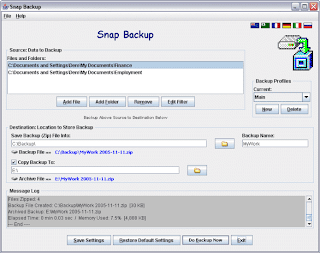Ubuntu Linux Adds Cloud to Ubuntu 9.10 Server
Canonical the business arm beyond Ubuntu Linux us hitting private cloud capabilities in an upgrade to its Ubuntu Linux OS being announced.
Available for free download by October 29 2009, Ubuntu 9.10 Server Edition introduces UEC (Ubuntu Enterprise Cloud), an open source cloud computing environment based on the same APIs as Amazon EC2 (Elastic Compute Cloud). Businesses can take advantage of private clouds, Canonical said. Ubuntu 9.10 BETA is available h3r3
"Essentially, what this release is doing is targeting cloud computing, in particular," said Steve George, director of support and services for Canonical. With version 9.10, users can take core ideas of cloud computing, including agility, resource pooling, and actualization, in deploying clouds on their own hardware, George said.
Users can set up 10 to 15 private servers and use the same APIs as in Amazon EC2, thus leveraging the same capabilities they would use with Amazon, George said. Applications can be taken off the Amazon cloud and put into the user's own cloud, or vice versa. I'm seeing this will boost Cloud usages and application by making it available on your own lab and network
UEC is an umbrella name for a set of cloud technologies including the Eucalyptus project, which provides an open source system for implementation of on-premise and hybrid clouds using hardware and software already in place. UEC, Canonical said, makes it easy to deploy and manage a cloud environment. Eucalyptus link is h3r3
Eucalyptus backing piqued the interest of analyst Stephen O'Grady, of RedMonk.
Previously codenamed "Karmic Koala," Ubuntu 9.10 also will be available on the Amazon EC2 environment as an Amazon Machine Image. UEC images are identical to Ubuntu AMI; work done in one environment can be uploaded to the other, Canonical said.
A store capability is being prepared in UEC to provide users with access to ready-to-deploy applications in the UEC environment.
Also featured in version 9.10 is the addition of the MySQL 5.1 database. The directory stack and single sign-on tools add improved directory integration and Django now ships as a supported framework to enhance Web server options. We all know that Ubuntu and Canonical are in love with Python this is MAY BE why Ubuntu integrated Django !
Some of the improvements in Ubuntu 9.10 are :
1) Kernel improvements better support Xen and KVM virtualization and improve caching performance.
2) Support for the USB 3.0 protocol enables "super speed transfer rates" when devices become available, Canonical said.
3) OpenLDAP integration is featured for mixing Ubuntu into an existing LDAP network, providing for centralized authentication and authorization.
4) GRUB 2 by default
5) ext4 by default
6) Ubuntu One
System management support is featured for WBEM (Web-based enterprise management) protocols. This enables support of the Ubuntu environment via popular system management tools.
Reference link on Infoworld is h3r3
Available for free download by October 29 2009, Ubuntu 9.10 Server Edition introduces UEC (Ubuntu Enterprise Cloud), an open source cloud computing environment based on the same APIs as Amazon EC2 (Elastic Compute Cloud). Businesses can take advantage of private clouds, Canonical said. Ubuntu 9.10 BETA is available h3r3
"Essentially, what this release is doing is targeting cloud computing, in particular," said Steve George, director of support and services for Canonical. With version 9.10, users can take core ideas of cloud computing, including agility, resource pooling, and actualization, in deploying clouds on their own hardware, George said.
Users can set up 10 to 15 private servers and use the same APIs as in Amazon EC2, thus leveraging the same capabilities they would use with Amazon, George said. Applications can be taken off the Amazon cloud and put into the user's own cloud, or vice versa. I'm seeing this will boost Cloud usages and application by making it available on your own lab and network
UEC is an umbrella name for a set of cloud technologies including the Eucalyptus project, which provides an open source system for implementation of on-premise and hybrid clouds using hardware and software already in place. UEC, Canonical said, makes it easy to deploy and manage a cloud environment. Eucalyptus link is h3r3
Eucalyptus backing piqued the interest of analyst Stephen O'Grady, of RedMonk.
Previously codenamed "Karmic Koala," Ubuntu 9.10 also will be available on the Amazon EC2 environment as an Amazon Machine Image. UEC images are identical to Ubuntu AMI; work done in one environment can be uploaded to the other, Canonical said.
A store capability is being prepared in UEC to provide users with access to ready-to-deploy applications in the UEC environment.
Also featured in version 9.10 is the addition of the MySQL 5.1 database. The directory stack and single sign-on tools add improved directory integration and Django now ships as a supported framework to enhance Web server options. We all know that Ubuntu and Canonical are in love with Python this is MAY BE why Ubuntu integrated Django !
Some of the improvements in Ubuntu 9.10 are :
1) Kernel improvements better support Xen and KVM virtualization and improve caching performance.
2) Support for the USB 3.0 protocol enables "super speed transfer rates" when devices become available, Canonical said.
3) OpenLDAP integration is featured for mixing Ubuntu into an existing LDAP network, providing for centralized authentication and authorization.
4) GRUB 2 by default
5) ext4 by default
6) Ubuntu One
System management support is featured for WBEM (Web-based enterprise management) protocols. This enables support of the Ubuntu environment via popular system management tools.
Reference link on Infoworld is h3r3

Comments